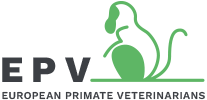BYLAWS
European Primate Veterinarians (EPV)
ARTICLE 1 : Name and Headquarters
This organization will be called: European Primate Veterinarians (EPV)
It is ruled by articles 21 to 79-III of local Civil Code in French departments Bas-Rhin, Haut-Rhin and Moselle, and by present by-laws.
The headquarters of the Association is settled in Centre de Primatologie of Louis Pasteur University
(Strasbourg)
Fort FOCH
F-67207 Niederhausbergen
France
The Association is entered in association register of tribunal d’instance in Schiltigheim.
ARTICLE 2 : Mission statement
This association aims to get together veterinarians or experts working with Non Human Primates (NHP) in clinic, research institutes, University, Government, Industry, zoo, sanctuaries.
The objectives of the association are: to provide a mechanism by which veterinarians may speak collectively on matters regarding NHP,
to promote fellowship among primate veterinarians to facilitate knowledge exchange, research in primatology and training, to propose a European interface to promote the dissemination of information, advices, expertise or
recommendations relating to the health, care and welfare of NHP, and all circumstantial measures included to protect the professionals working with NHP.
The association acknowledges the following points:
The high vulnerability of NHP species which are protected under international laws, and the need to preserve them in their natural habitat.
The fact that some numbers are present in captivity in Europe for conservative, educative or scientific purposes, and the need to provide them special attention and care.
The need to use in Europe some of NHP species, purpose bred, in benefit of human or animal health, when no other inferior species or alternative method is pertinent to answer to a scientific question or to regulation requirements.
The main role of veterinarians to ensure housing and/or utilisation of captive NPH in respect of European zootechnical, sanitary, ethic and regulation standards.
The need to enhance knowledge in NHP species, especially in veterinarian medicine field, thanks centralizing, sharing, improving any data collected among wild and captive numbers.
ARTICLE 3 : Means of action
To reach its goals, the Association will work to enhance an international veterinarian network thanks to:
Annual Symposiums
Expert groups
Web site and web list
Training network
And any other action that may reinforce the objectives of the association.
ARTICLE 4 : Duration
Duration is unlimited.
ARTICLE 5 : Financial resources
The Association is a non profit organization.
Resources of the association are made of: Membership fees, fees amounts are proposed each year by Board of Directors and must be approved by members in business meeting incomes from events organized by the association, public grants, bequests and donations incomes or retribution for services incomes from capitals goods and values of the association any resources allowed by current laws and regulations. Resources can’t be discriminatory.
In order to promote or support special events, a reserve fund may be set up. Each year, it will be credited a part of the surplus of the resources which is not necessary to the functioning of the association for the next service. The proportion and the composition of this reserve fund can be modified by member deliberation in Business meeting.
ARTICLE 6 : Membership
The membership will consist of members, honorary members and benefactor members. Each member commits himself to respect present bylaws. May apply to be a member any physical person,
– Veterinarians or vet students, engaged in a professional activity related to the health, care and welfare of NHP, to research in NHP or to any action improving knowledge or conservation of NHP
– Recognized experts in the field of NHP care, welfare, behavior, pathology,and so on – as “non-vet members”-, on Board agreement, in view of the expertise they can provide to EPV in all theses fields
– Benefactor members
Applicants for membership must be nominated by two members of the Association. Membership applications will be reviewed by the Secretary and application will be approved or denied by Board in best delay. Members are entitled to speak and vote. Honorary member title can be conferred by the Board to any person who have been helpful to the association. This title allows attendance to Business meetings with consultative voice. Benefactor title is conferred to any moral person (Institute, Society, Organization, if their bylaws are conformed to those of EPV) paying the majored fees. Application will be reviewed by the Secretary and will be approved or denied by Board in best delay. Benefactor members can be represented by one of
their accredited members during Business meeting without right of vote.
The initial membership will consist of veterinarians who have attended the meeting held in Tortosa, Spain on 27- 29th of September 2007 or who have attended to a minimum of 2 previous symposiums. They are declared funding members as soon as they pay the membership fees, and they elect the initial Board.
ARTICLE 7 : Membership withdraw
Membership may be withdrawn for:
– Resignation addressed to the Board
– Death
– Banning by board and pronounced by members in Business meeting on report of the Board for non payment of 2 years fees or for serious cause.
ARTICLE 8: Board of Directors
The officers of the organization will be 7 members elected in business meeting.
Terms in office: The Board of Directors’ members are elected for 3 years. They can be re-elected for a second service and then after one year of interruption. Elections will be held at each annual meeting, with renewal of a part of the full Board every year. Voting will be done by members utilizing closed, written ballots.The candidate for each office who receives the greatest number of votes will be declared elected. Officers chosen will take office at the end of the annual business meeting.
Every year, just after the Board of Directors renewal, the Board shall elect from among its members: A President, A Vice-President, A Secretary, A Treasurer.
In case of vacancies the association will nominate temporary deputies. In the following Business Meeting, decisions about replacements will be taken. The role of deputies will be finished when the membership of replacements are expired in a normal duration.
ARTICLE 9 : Authorities and duties of the Board of Directors
The President is the legal representative of the association. The Board will decide about daily administration which is not under the order of Business Meeting subjects. The Board will report to the Business Meeting on their decisions taken on behalf of the whole association.
The Board will assume the secretary of the Business Meeting and will supervise the inscription on the register of associations which has to be effected within 3 months. The Board will propose to the general assembly
The Board will propose measures of memberships´ cancellation. The Board will open bank accounts with credit institutions, make payments and contract loans as and when it deems fit.
The Board will take all decisions regarding contracts, marketing, investments, purchases, sales, requests for subsidies necessary for the running of the association etc. The Board will also be responsible for contracting employments and fixing salaries for jobholder working for the association.
The administration council will meet: at least once a year; whenever the President will convoke it; on demand of one third part of the members of the association.
The agenda will be defined by the President and will have to be sent to all officers by the secretary two weeks before the meeting will take place
The secretary general will ensure that these are sent by post or email at least 2 weeks before the date of the meeting.
For validity of deliberations the attendance of one half part of the Board´ s members will be necessary. A table of attendance will have to be signed by each participant of the meeting. Decisions will be taken on majority, . In case of equity of votes the President´ s voting is decisive. The minutes of each session will be kept. The president, the vice president and the secretary general will sign these.
The Board will be reserved the right to invite any consultant to assist in the realization of the association´ s objectives.
ARTICLE 10 : Payment and refunds of expenses
The members of the Board will not be paid for theirs activities. They will pay the annual fee. Expenses incurred in carrying out their duties may be reimbursed on production of receipts on President agreement.
ARTICLE 11 : Business meeting: convocations and organization
The business meeting will consist of members who are entitled to vote and honorary and benefactor members with consultant rights. The business meeting will take place in a one year term convoked: by the President on request of one half of the Board´ s members, on request of one third of the association’s membersThe convocations including the agenda drawn up by the Board will be sent to the members by the secretary general, by post or email at least 15 days before the set date. The President may invite the association’s employees and anyone else he may deem to be helpful to the Business meeting but without the right of vote.
Procedure and voting: For valid deliberations the attendance, or the representation by proxy (limited to 2 per person), of one third part of the members with voting rights will be necessary. If the quorum of one third of the members is not be reached, the President will organize a new Business Meeting within two months. In this meeting valid deliberations can be executed without respect to the quantity of attending members or representatives. The agenda will be the same as of the previous meeting.
The voting will be carried out by open ballots (hand signs) unless anyone objects, in which case the voting will be by secret ballots. The resolutions of the Business Meeting will be approved by majority of valid votes.
The election of members to the Board will be carried out by secret ballot according to the regulations found in article 8.
Organisation: The President will be assisted by the officers of the Board. He will chair the meeting, expose the moral situation of the association and talk about the ongoing projects of the forthcoming year. The treasurer will give a financial report of his business administration and will submit the balance to the Business Meeting for approval. The agenda will be defined by the Board chairing the conference. Only the questions which are part of
the agenda will be an object of vote and decision. All deliberations and resolutions of the Business Meeting will be reported in meeting minutes and
recorded in a register named “deliberations of general meetings” and approved by the President and the Secretary by signature. Every year all the members of the association will get an annual report.
ARTICLE 12: Authorities of the Business Meeting
The decisions of the Business Meeting will be obligatory for all members also the absent persons. The authorities of the Business Meeting will be limited by the Code Civil local and the present by-laws. The Business Meeting will hear the reports about the Board’s management and in particular about the moral and financial situation of the association. The Business Meeting will care about the following topics: deliberation and decision about the different reports, approval of the balances of the past business year, elections on the budget of the forthcoming business year, deliberation about all topics of the agenda. The Business Meeting will also nominate or renew Board membership as required. The Business Meeting will set up the amount of the annual contributions and the admission fees for different categories of membership. The Business Meeting have the authority to exclude a member for misdemeanour on the report of the Board. The Business Meeting will also examine any matters that are not part of the Board’s authority.
ARTICLE 13 : Modification of the by-laws
A modification of the by-laws will be possible on request of the Board or one third part of the members of the association. The demand of modification will have to be forwarded to the Board at least one month before a respective meeting will take place.
The decision will be taken by the Business Meeting on majority of votes as long as this represents at least one third of the members which can be personally present or represented by proxy. If the quorum can not be reached, the Business Meeting will have to be summoned once again with a two-week interval. This time deliberations will be valid without consideration of the quorum. The decisions will only concern the approval or rejection of proposals of modifications proposed by the Board and included in the agenda.
The modifications of the by-laws will be recorded in a minute which has to be signed by the President and the Secretary General. The minutes will be transmitted to the tribunal within 3 months.
ARTICLE 14 : Dissolution of the association
The dissolution of the association will have to be decided by the Business Meeting. This meeting will have to be summoned particularly for this reason on request of at least two-thirds of all members.
This means that the Business Meeting will have to be composed of at least two-thirds of its active members. If this quorum has not been reached the Business Meeting will have to be summoned once again with a two-week interval. This time deliberations will be valid without consideration of the quorum. The dissolution will be announced on majority of the votes.
The Business Meeting will assign one or more administrators, members or non-members, who will be responsible for the liquidation of association’s assets.
The existing net assets can be attributed by the Business Meeting to:
– one or several associations pursuing similar objectives,
– one or several organizations pursuing general objectives.
ARTICLE 15 : Internal regulations
The Board can implement rules of the house in order to determine how to fulfill the present by-laws and to realize the internal organization of the association. The rules as well as its subsequent modifications will have to be approved by the Business meeting.
ARTICLE 16 : Approval of the status
The present by-laws have been accepted and approved by the Business Meeting, which has been constituted in Sevilla (Spain) on November 20, 2014.


